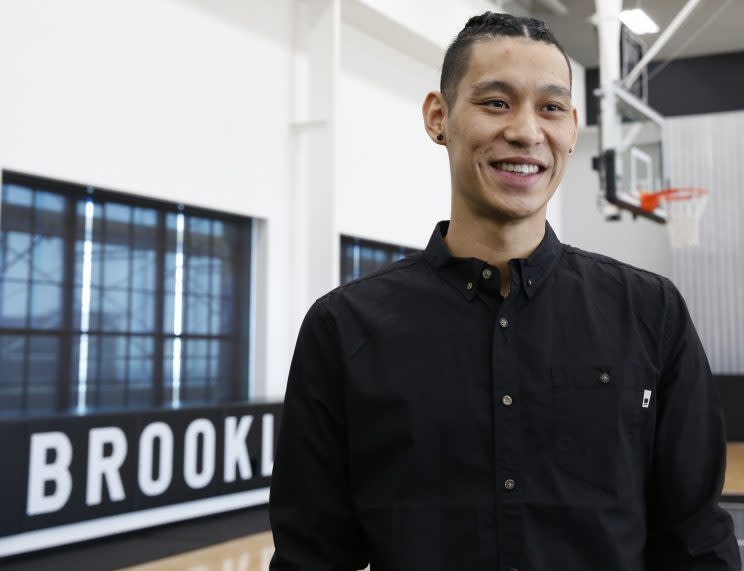Jeremy Lin on the 'double-edged sword' of being Asian-American in the NBA

This coming NBA season will mark the five-year anniversary of “Linsanity,” that glorious fortnight stretch when Jeremy Lin averaged 24 and nine for the surging New York Knicks in February 2012.
It’s impossible to understate just how larger than life Lin became almost overnight. In a matter of a month, he went from D-League afterthought to global icon. There were a confluence of events that influenced the sensation, among them that he was playing in New York City, that he was a Harvard kid pursuing basketball as a career and — undeniably — that he was an Asian-American in the NBA.
[Follow Dunks Don’t Lie on Tumblr: The best slams from all of basketball]
Time puts things in proper perspective, and since his post-Linsanity career has taken him to the Houston Rockets, Los Angeles Lakers, Charlotte Hornets and now back to New York with the Brooklyn Nets, the NBA’s first American-born player of Chinese or Taiwanese descent can view his playing days through a panoramic lens. And his thoughts on the topic from Media Day were framed perfectly:
“I’ve always said [race] is a double-edged sword [with] my story. You can just take the racial element alone. Anything I do is hyper-magnified in a good way or a bad way. People are quick to discount me or say certain things because of my race. And when I do well, people are quick to say he’s so amazing, whatever, because of my race, because of the way I look.
“In some ways, Linsanity wouldn’t have been Linsanity if I was a different skin color. Most likely, it wouldn’t have been as big of a deal, and that went to my advantage. But prior to that, a lot of the obstacles to even get to that point where I could get to a position of getting on the floor, those were definitely obstacles that were very much stereotypes that I had to fight along the way. So I’ve always understood that there’s good and there’s bad and you have to take them together and just be thankful for it all.”
Lin has long wondered if his Asian heritage is the reason he went under-recruited out of high school, telling his hometown newspaper in 2008, “It’s a sport for white and black people. You don’t get respect for being an Asian-American basketball player in the U.S.” Given his success, including a top-10 finish in Sixth Man of the Year voting six years into an NBA career, we’re all free to wonder whether he was undrafted out of college and unclaimed off waivers for a 10-month span in 2011 for a reason.
We must also consider the flip side. Did the Golden State Warriors hold a rare press conference for the signing of an undrafted rookie in 2010, listing his jersey for sale before he ever donned the uniform, because he was a Bay Area product? Or did those crowds, as San Jose Mercury News beat reporter Tim Kawakami so eloquently put it, “in a market that is rumored to have a few Asian-Americans walking around,” incessantly cheer for him on the end of the bench because of his race?
There’s no doubt Linsanity became a global phenomenon in February 2012, at least in part, because he’s an Asian-American. (Take Hassan Whiteside’s meteoric rise from the D-League in 2014 to $98 million man this summer. Whiteside’s ascendance was noteworthy, but nothing like Linsanity in terms of media attention.) Lin’s most recent comments about that working to his advantage suggest a refreshing self-awareness. The 6-foot-3 point guard signed with the Rockets for three years and $25 million in the wake of Linsanity — a contract Knicks teammate Carmelo Anthony called “ridiculous” at the time — and as recently as 2015 Lin was one of just 18 basketball players who made the Forbes list of highest-earning athletes, despite turning down tens of millions in potential endorsement deals.
All that despite coming off the bench for a 21-win Lakers team at the time. Of course, no amount of money excuses the racist remarks he’s received throughout his playing career, and as somebody who’s written several stories about him, I’ve seen that vitriol firsthand in the comment sections.
[Sign up for Yahoo Fantasy Basketball | Mock Draft | The Vertical | Latest news]
While still a member of the Hornets this past March, Lin told ESPN.com of the racial profiling he experiences, “It’s one of those things where it literally happens everywhere. At opposing arenas, it happens all the time. Just the other night in Brooklyn, I was trying to leave [Barclays Center] and one of the ladies was like, ‘Hey, I need your credentials for you to pass.’ And then someone else was like, ‘Oh, he’s a player. He’s good.’ I’m used to it by now. It’s just part of being Asian in the NBA.”
Lin has also long lamented the unfortunate side effects of his rapid rise to worldwide recognition. More recently, though, he’s come to terms with his identity as the NBA’s most famous Asian-American.
“When it first happened, it starts out awesome and it’s exciting,” Lin told The Vertical Podcast with J.J. Redick this past July. “Then everything happens so fast and you get scared. Then you don’t trust people and can become jaded. Then you think of it as kind of a burden. Once you get over that, you slowly start to appreciate it and become more thankful, appreciating the fans, the experience, more.”
Now 28 years old, Lin told reporters in Brooklyn this week that he always wanted to return to the spotlight of New York, but only when the time was right. Five years after Linsanity, that time is now.
– – – – – – –

is a contributor for Ball Don’t Lie and Shutdown Corner on Yahoo Sports. Have a tip? Email him at rohrbach_ben@yahoo.com or follow him on Twitter! Follow @brohrbach



